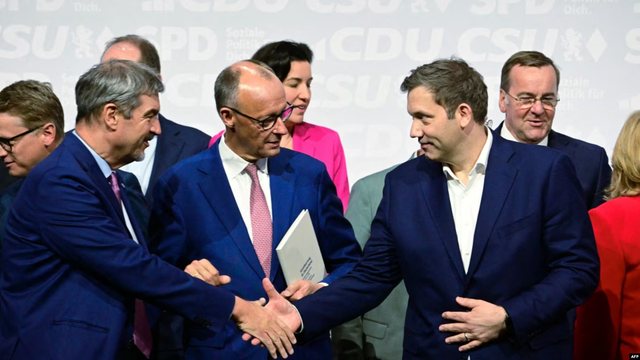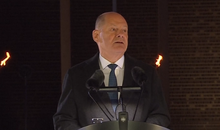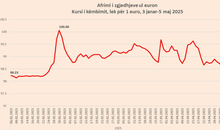
 Flash News
Flash News
From the maritime agreement with Greece to the Rama-Soros connection, Berisha speaks about the Greek media
The collapse of the massive chrome mine, still no sign of the old man in Klos
Video/ Serious accident in Peshkopi, drunk driver takes money from police officer
Serious in Prizren, father kills 15-year-old daughter, injures wife and other daughter
'Vote Exchange': Shkodra between the PS-PD rivalry and the "Doshi" factor
From defense to immigration, what does the new German government promise?

Germany's new governing coalition, led by conservatives, begins work on Tuesday under the leadership of new Chancellor Friedrich Merz, about three months after February's parliamentary elections.
The coalition – made up of the Christian Democrats of Merz (CDU), the Christian Social Union of Bavaria (CSU) and the center-left Social Democratic Party (SPD) – is set to govern Germany for the next four years.
These three parties drew up a governing program in the coalition agreement in April, promising to revive the weakened economy, tighten immigration rules and cut state spending.
Critics have argued that the 144-page document lacks concrete commitments, and that even those promises that are included are limited by what has been called a "financial conditionality."
However, Merz is expected to have more budgetary flexibility than his predecessor Olaf Scholz, after the parties swiftly passed a historic package in parliament, changing constitutional rules to allow increased defense spending and approving a 500 billion euro fund for infrastructure and climate protection measures.
So, what achievements have the coalition partners pledged to achieve?
Strengthening the economy
The new government's main task will be to restart Germany's economic engine, as the country's economy has stalled for two consecutive years following Russia's invasion of Ukraine.
To encourage investment, the coalition will allow companies to exempt 30 percent of their investments from tax for the next three years, while corporate income tax will be gradually reduced from 2028.
The partners also want to reduce bureaucracy, by abolishing the German Supply Chain Act that came into force in 2023 and oversees human rights and environmental risks along a product's supply chain.
Instead, German companies will be subject to the EU Supply Chain Directive, avoiding additional documentation.
The coalition also aims to combat high energy costs and set a price ceiling for industries that consume a lot of electricity.
Curbing immigration
The most controversial topic during the election campaign in Germany was curbing immigration, after several attacks were blamed on refugees.
The coalition has pledged to maintain border control and to turn back illegal immigrants, even if they seek asylum. But the decision will be made "in coordination with our European neighbors."
Nuk do të miratohet asnjë program i ri për risistemim vullnetar të refugjatëve, ndërsa refugjatët me status të kufizuar mbrojtjeje nuk do të lejohen të sjellin anëtarët e familjes në Gjermani për një periudhë fillestare prej dy vjetësh.
Qeveria e re planifikon gjithashtu t’i ndryshojë rregullat për shtetësinë, duke hequr rrugën për marrjen e nënshtetësisë pas vetëm tri vjetësh qëndrimi për emigrantët e integruar mirë në veçanti.
Megjithatë, do të ruhet ulja e kërkesës standarde të qëndrimit për shtetësi nga tetë në pesë vjet, si dhe mundësia e shtetësisë së dyfishtë për banorët nga vende që nuk janë anëtare të BE-së.
Mbrojtja, siguria dhe politika e jashtme
Administrata e Merzit do të përballet me një botë që po pëson ndryshime, pasi Evropa po lëkundet nga rikthimi i Donald Trumpit në Shtëpinë e Bardhë.
Marrëveshja e koalicionit rithekson angazhimin e partive ndaj Bashkimit Evropian, NATO-s dhe partneritetit ekonomik transatlantik me SHBA-në, pavarësisht politikave agresive tregtare të Trumpit.
Në lidhje me mbrojtjens, administrata e re synon ta krijojë një program për shërbim ushtarak vullnetar sipas modelit suedez, pothuajse 15 vjet pasi vendi pezulloi rekrutimin.
Gjithashtu, do të krijohet një Këshill i Sigurisë Kombëtare, që do të mbledhë të dhëna dhe do të mundësojë vendimmarrje më të shpejtë për krizat kombëtare dhe ndërkombëtare.
Buxheti dhe shpenzimet sociale
Koalicioni dëshiron të kursejë në shpenzimet qeveritare duke bërë shkurtime të mëdha në buxhetin federal.
Në administratën civile, do të shkurtohen 8 për qind e vendeve të punës për katër vjet – me përjashtim për forcat e sigurisë.
Numri i komisionarëve federalë – ekspertë të pavarur që këshillojnë qeverinë – do të përgjysmohet, ndërsa do të kursehen gjithsej 1 miliard euro në programet e zhvillimit dhe kontributet për organizatat ndërkombëtare.
Reforma e mëparshme e përfitimeve të papunësisë, e njohur si “të ardhura qytetare”, do të riemërtohet në “siguri bazë për punëkërkuesit” dhe do të ashpërsohet.
Në raste ekstreme, do të jetë e mundur “heqja e plotë e përfitimeve” nëse një person refuzon vazhdimisht vende të arsyeshme pune.
Koalicioni gjithashtu mund të reformojë rregulloren për 8-orëshin e punës ditore, duke e zëvendësuar atë me një kuadër javor për orarin e punës.
Në një fitore për Socialdemokratët, marrëveshja përfshin angazhimin për një pagë minimale prej 15 eurosh në orë.
Taksat dhe subvencionet
Palët kishin dallime të mëdha rreth taksave gjatë fushatës – blloku konservator CDU/CSU premtoi ulje të taksave, ndërsa SPD-ja kërkonte t’i rriste ato për ata me të ardhura të larta.
Marrëveshja është një kompromis: synohet ulje e tatimit brenda dy vjetësh për ata me të hyra të mesme dhe të ulëta.
Shtesa kontroverse 5.5 për qind për “solidaritetin”, e përdorur për të financuar kostot e bashkimit gjerman, do të mbetet në fuqi për qytetarët dhe kompanitë me të ardhura të larta, ndërsa subvencionet për udhëtarët do të zgjerohen.
Speaking of transport, the "Deutschlandticket" ticket - which offers unlimited access to regional public transport for a monthly price of 58 euros - will remain valid after 2025, but users should prepare for price increases from 2029.
Other promises include: a legal right to maternity leave for self-employed women, and an expansion of the “mother’s pension,” which compensates parents for years spent raising children. The standard pension level will be set at 48 percent of average earnings by 2031.
Cash payments, cannabis and coronavirus
The document also contains further commitments in various areas, from cash payments to cannabis policy.
Many visitors to Germany are surprised by the widespread use of cash in small shops.
Under the agreement, the coalition aims to offer at least one digital payment option to consumers.
Meanwhile, the previous government's partial legalization of cannabis for adults will be reviewed, and an official commission will be established to investigate the strict measures taken during the coronavirus pandemic./Radio Free Europe
Latest news


Incident in Korça, court releases Bledion Nallbat's brother
2025-05-06 14:27:19
Kopliku: The vote on May 11 for the DP-ASHM is the deserved punishment for Rama
2025-05-06 14:21:23
"Revival Caligula", Bujar Kapexhiu's gem of a caricature about Rama
2025-05-06 14:12:06
Rama's former negotiator, Zef Mazi, rejects EU passport propaganda
2025-05-06 14:07:43
The president of the Forza Italia senatorial group supports Berisha on May 11th.
2025-05-06 13:57:57
The Appeal Court of Appeal declares the mayor of Devoll, Eduard Duro, innocent.
2025-05-06 13:52:33

May 11th Elections, Bylykbashi: Extend the validity period of documents
2025-05-06 13:29:39

Convicted in Greece, after SPAK DP request to ILD: Dismiss judge Irena Gjoka
2025-05-06 13:09:35
Electoral crimes, SPAK takes stock: 115 reports have been filed so far
2025-05-06 13:00:37
Quarrel between two families in Has, two people injured
2025-05-06 12:53:08
Voice before SPAK: I do not withdraw from the accusations against Vilma Nushi
2025-05-06 12:33:33


"Giro d'Italia" in Albania, here's how car traffic changes in Tirana
2025-05-06 12:04:17


The collapse of the massive chrome mine, still no sign of the old man in Klos
2025-05-06 11:29:31
Xhaferri: Crime gangs work for the MPs they want
2025-05-06 11:19:53
Zhupa in Ksamil: 'The Maldives of Europe' turned into a trash can
2025-05-06 11:10:55
Merz fails to be elected German chancellor
2025-05-06 11:00:00
The fall of the euro is boosting imports in quantity, increasing by 14% in 2024
2025-05-06 10:56:33
Accident in Roskovec, two passengers injured
2025-05-06 10:47:36


DP denounces election crimes in Peshkopi to SPAK
2025-05-06 10:18:20
The hearing against Mediu is postponed, due to Irena Gjoka's medical report.
2025-05-06 10:08:50
Two accidents in Elbasan, 1 victim and 2 injured reported
2025-05-06 09:52:26


Rama pressures citizens: Either vote for the SP, or don't vote at all
2025-05-06 09:15:00
From defense to immigration, what does the new German government promise?
2025-05-06 09:08:42
After 1,245 days in office, Scholz steps down as chancellor
2025-05-06 08:55:38


'Vote Exchange': Shkodra between the PS-PD rivalry and the "Doshi" factor
2025-05-06 08:29:28
Horoscope, what do the stars have in store for you today?
2025-05-06 08:23:05
Rain returns, what is the weather expected to be like during the day?
2025-05-06 08:06:41
Morning Post/ In 2 lines: What mattered yesterday in Albania
2025-05-06 07:50:44

Topalli: Small parties have no chance of getting a mandate
2025-05-05 22:42:40
SP officials in prison for corruption, Rama: We are not a law firm
2025-05-05 22:36:42


Soul-touching hours: Discover when we are saddest and happiest during the day
2025-05-05 21:47:20
Alimehmeti: DP in Tirana gets more than 12 mandates
2025-05-05 21:34:33


Berisha: Rama knows Dibra as much as Toni Gogu knew Hajredin Pasha
2025-05-05 21:01:00





27-year-old drunk driver hits police officer in Peshkopi
2025-05-05 19:50:14
'Giro d'Italia' in Albania, how will vehicle traffic be diverted in Tirana
2025-05-05 19:36:32
Meta: Rama is afraid of losing, that's why he calls for non-participation
2025-05-05 19:25:19


Këlliçi: Let's stop propaganda and return Tirana to the citizen
2025-05-05 18:43:47
Rama deepens scandal, calls again for election boycott
2025-05-05 18:25:53


Indian learns 80 numbers in 13.5 seconds, becomes world champion
2025-05-05 17:50:22

The moral damage of promises, an electoral bubble
2025-05-05 17:23:59
Albanian arrested in France, caught with 11 kg of cocaine
2025-05-05 17:08:22


The best and worst foods for a healthy liver
2025-05-05 16:41:45
Another country lifts visa requirements for Kosovo
2025-05-05 16:28:49



Judicial confrontation with OSHEE, Bardhi is declared innocent
2025-05-05 15:50:40
Bozdo: The panicked SP is preparing vote buying
2025-05-05 15:41:06
Zhupa publishes drone footage: DP will cancel the strategic investment law
2025-05-05 15:37:29

The week starts badly for 3 zodiac signs, here's what the stars predict!
2025-05-05 15:13:53
73-year-old arrested for wounding brother in Malësia e Madhe
2025-05-05 15:04:20



Jonathan Islam falls from a parachute
2025-05-05 14:36:21

Lawsuit filed against Dodik, accused of insulting Bosniaks
2025-05-05 14:12:48


Topalli denounces SP officials: They are manipulating votes in Greece and Italy
2025-05-05 13:49:25
Monika Kryemadhi appears at SPAK dressed in black
2025-05-05 13:24:47


SPAK files another charge against Ajola Xoxa, also accused of concealing income
2025-05-05 12:52:23
Sanctions and war tribunal on the agenda of EU ministers
2025-05-05 12:29:10
Rama insults and offends Bledjon Nallbatin: How can Democrats vote for a thug?
2025-05-05 12:21:41

May 5, National Martyrs' Day
2025-05-05 11:50:22
